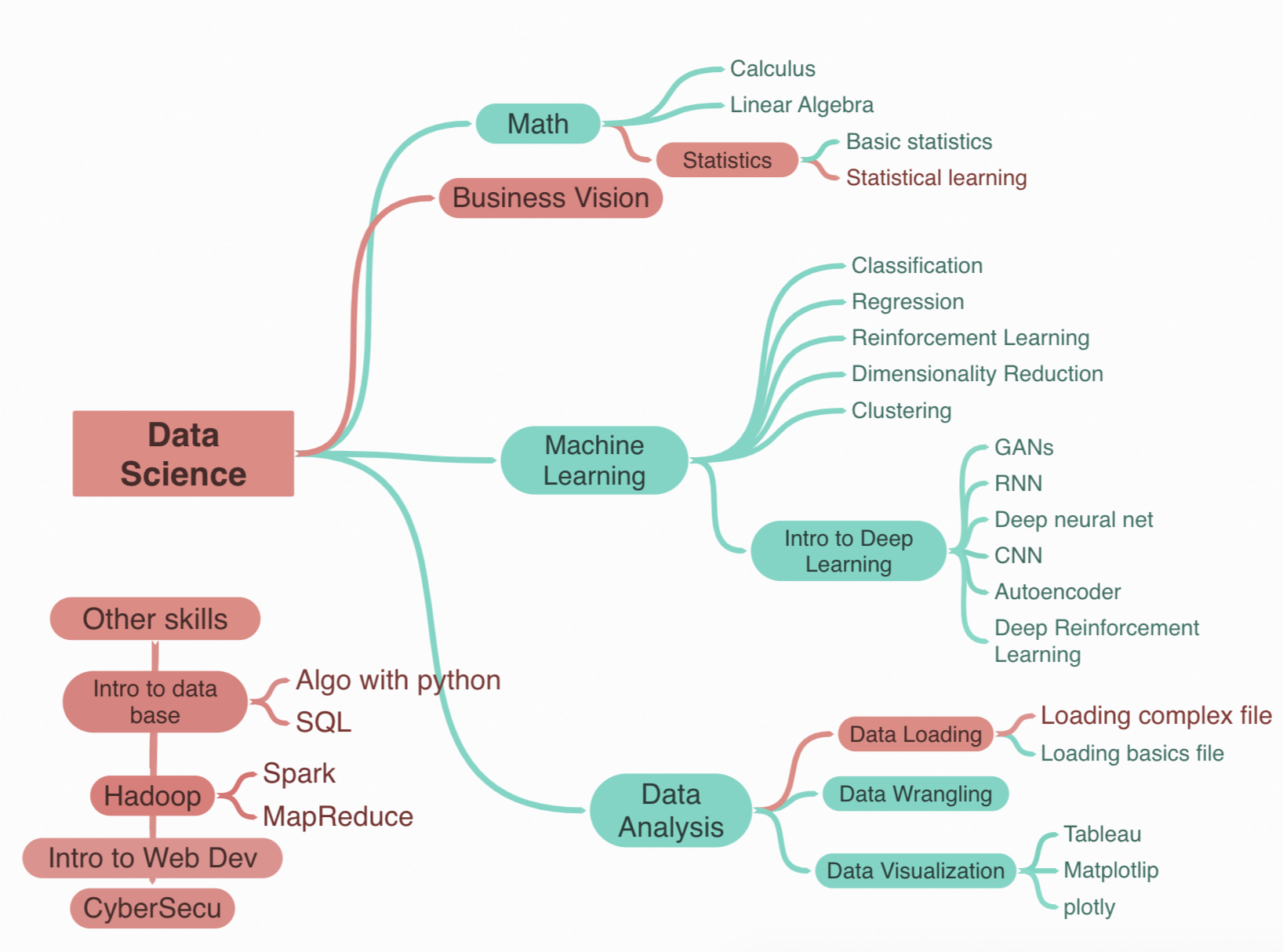How I learned Data Science?
Hey, welcome on bord, here you can follow my progress in data science. Below I have mapped the learning path I am following. I will update that path as I discover more content. Of course, it is not an exhaustive list.
Progress and futur work

- Go deeper in the math
- Introduction to statistical learning
- Reading again some chapter of Hand-on ML
- Business insight with the book Data Science for Business
- Practice, practice and practice again
- Achieve all the project on Hand-on ML
- Introduction to Database
- Introduction to algorithm with python
- SQL
- Introduction to Hadoop
- Introduction to web dev (1 week challenge) - create the version 2 of the blog
- Introduction to cyber security
My Curiculum
In the next following sections, we will go through all this different fields.
1. The big picture of Data Science
First, it is important to have a good overview of this broad subject. In that purpose, understanding the job of a data scientist is primordial. As a resume, I gather in the list and the mind map bellow all the “tools” you and I will need to master in Data Science:
- Learn to code - Python is an excellent first option with a large community and strong libraries for Data Science
- Data Analysis to gain insight from data
- Machine Learning to make prediction and draw conclusion from this insight
- A good understanding of Math and Algorithms is mandatory
2. A spark of motivation
As a spark of motivation I start by understanding the basic of Machine Learning. The goal here is to gain sens and motivation for the futur work in math and code. I recommend Vishal Maini & Samer Sabri’s book, this is a good resource to start with the big picture of artificial intelligence and machine learning.

This series is a guide for getting up-to-speed on high-level machine learning concepts. It is easy to understand with a good mixte between analogies, examples and technical explanation. You will find a lot of different resources to go deeper in the different fields - projects, videos, books and so much more. The authors give as well some interesting personal advice at the end of the book.
What I have learned?
- good insight and first intuition about the different fields of Machine Learning
3. Math
To have a deeper understanding of machine learning, I review some mathematical knowledge. My goal is about creating mathematical intuition rather than learn the formulas and computation methods.
✔︎ Introduction to Linear Algebra and Calculus
Essence of Linear Algebra & Essence of Calculus: I highly recommend to see the videos of Grant Sanderson. His visual approach with superb animations will give you a solid conceptualization of those subjects.
✔︎ Multivariable calculus
MVC Khan Academy: Khan Academy and Grant Sanderson worked together in the purpose to create a course with a visual meaning of important tools useful in the field of Multivariable Calculus. I realy enjoy the part on Maxima and Minima and Constrained Optimization. You will learn about Gradient, Laplacian, Lagrangian multiplier and so on.
✔︎ Probability and Statistics
Statistics and probability Khan Academy: This interactive and well-designed course provides an introduction to important tools as Regression, Confidence Intervals, Significance Test and so much more.
What I have learned?
- review the important tools of Multivariable Calculus and Statistics
- obtain a deep visual understanding of those concepts
4.Data Analysis
If you want to get into Data Science, you have to know how to manipulate data. Most of your time, as a data scientist engineer, will be spend on manipulating, analysing and getting data ready for modeling. I recommend to perform data analysis with pandas, the popular open source library for data analysis in Python.
One of the creator of pandas, Wes McKinney, wrote a book called “Python Data Analysis” and it is a really good choice for learning data analysis in Python. This book show you how to solve a broad set of data analysis problems effectively. You will get complete instructions for manipulating, processing, cleaning, and crunching dataset. It is well written and the real-world examples are really usefull to understand the workflow of data analysis in Python.

As a complement, in the Harvard course on Data science, you will find great lectures on data analysis. I really recommend to at least take a look to Exploratory Data Analysis and effective Visualizations, you will discover some usefull principles for effective visualization. Take also a look at plotly and Tableau to complete your skills in data visualization.
What I have learned?
- use flexible tools to load, clean, transform, merge, and reshape data
- create informative visualization with matplotlib
- apply the pandas groupby facility to slice, dice and summurize datasets
- manipulate time series data
- learn how to solve real world data analysis problems with detailed examples
5. Machine learning
Through the book Hands‑On Machine Learning with Scikit‑Learn, Keras, and TensorFlow by Aurélien Géron I discovered the machine learning landscape. Each chapter ends by a quizz and few coding project. A really enjoy this mix between learning new knowledge, testing your understanding with the quizz and practising on project.

What I have learned?
- Explore the machine learning landscape, particularly neural nets
- Use Scikit-Learn to track an example machine-learning project end-to-end
- Explore several training models, including support vector machines, decision trees, random forests, and ensemble methods
- Use the TensorFlow library to build and train neural nets
- Dive into neural net architectures, including convolutional nets, recurrent nets, and deep reinforcement learning
- Learn techniques for training and scaling deep neural nets
“Value of knowledge shouldn’t depend upon where that knowledge was acquired” — Giles McMullen-Klein. Special thanks to this guy who gathers a lot of different resources about data science. Those videos are superb and motivational.